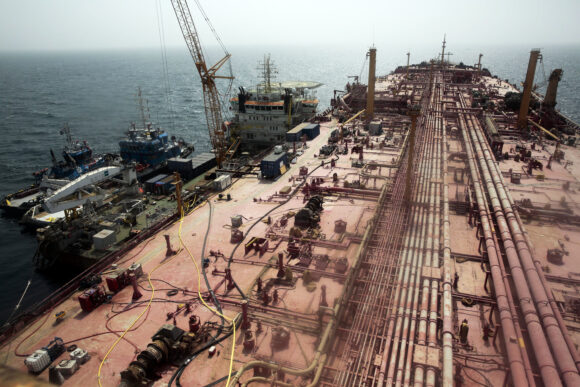The United Nations Development Programme (UNDP) announced the successful binding of insurance coverage for the mission coordinated by the United Nations to prevent over a million barrels of oil spilling into the Red Sea.
Securing insurance is a pivotal milestone in enabling the ship-to-ship transfer operation (STS), which aims to avert one of the world’s largest, man-made disasters in history, said UNDP in a statement.
The UNDP, with support from its Insurance and Risk Finance Facility, was able to bind coverage as a result of “its deep, long-term collaboration with the insurance industry,” the UN agency said.
The Dangerous $140M Mission to Defuse an Oil Tanker Ready to Explode
More than 100 individual underwriters have been involved in the issuance of an exceptionally specialized set of policies covering FSO Safer, the STS operation and the replacement vessel.
Howden, appointed in open tender as UNDP’s broker, packaged, structured and then syndicated the various risks across thirteen insurers in the Lloyd’s, London and P&I markets.
The mission could not progress without insurers offering their balance sheets to underwrite the residual financial risk, the agency said.
UNDP Administrator Achim Steiner highlighted the importance of finalizing the insurance policies, both in terms of financially de-risking the operation, and for protecting millions of lives, livelihoods and aquatic species.
“FSO Safer is an ecological and humanitarian timebomb. Without urgent intervention, the damage to the environment, lives and livelihoods could be immense. Insurance became a critical element of enabling this salvage operation to proceed,” commented Steiner.
“Without it, the mission could not go forward. UNDP has been broadening and deepening its work with the global insurance community over recent years,” he said.
Steiner said the UNDP is “especially grateful to Howden for facilitating this process with the insurance industry on this critical initiative to ensure that coverage has been secured in the most challenging of contexts.”
Constructed in 1976 and converted a decade later into a floating storage and offloading facility (FSO) for oil, FSO Safer is carrying 1.14 million barrels of light crude. However, maintenance of FSO Safer was suspended in 2015 upon the outbreak of the conflict in Yemen, the UNDP said.
As a result, the structural integrity of the 47-year-old vessel has significantly deteriorated, and – without immediate action – the vessel will break apart or explode, threatening more than 17 million people and 200,000 livelihoods, as well as coral reefs, mangroves and fish stocks of every country on the Red Sea.
Complicating matters further, FSO Safer sits in waters that are designated as “high risk” by the Joint War Committee in London, the body which de facto sets insurance rates and exclusions for marine war underwriters globally.
The UNDP-led operation, which involves the transfer of the oil to a replacement vessel and the scrapping of FSO Safer at a green salvage yard, is highly complex and involves a range of environmental, geopolitical, financial and humanitarian risks, according to UNDP.
Source: United Nations Development Programme (UNDP)
Photograph: Technical vessels are seen by the decrepit Safer tanker on Monday, June 12, 2023, off the coast of Yemen. Safer has posed an environmental threat since 2015, as it decayed and threatened to spill its contents of 1.14 million barrels into the Red Sea and Indian Ocean. In May, the United Nations announced that the first step of the ship’s salvage process had begun, with the arrival of a ship that would remove atmospheric oxygen from the ship’s oil chambers. (AP Photo/Osamah Abdulrahman)
Was this article valuable?
Here are more articles you may enjoy.



 Insurance Issue Leaves Some Players Off World Baseball Classic Rosters
Insurance Issue Leaves Some Players Off World Baseball Classic Rosters  State Farm Adjuster’s Opinion Does Not Override Policy Exclusion in MS Sewage Backup
State Farm Adjuster’s Opinion Does Not Override Policy Exclusion in MS Sewage Backup  Portugal Deadly Floods Force Evacuations, Collapse Main Highway
Portugal Deadly Floods Force Evacuations, Collapse Main Highway  Insurify Starts App With ChatGPT to Allow Consumers to Shop for Insurance
Insurify Starts App With ChatGPT to Allow Consumers to Shop for Insurance 

